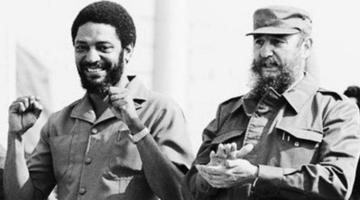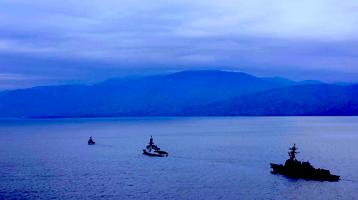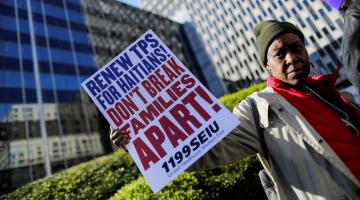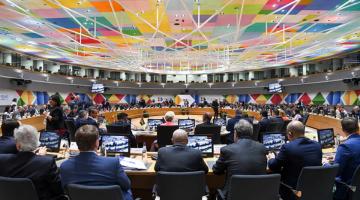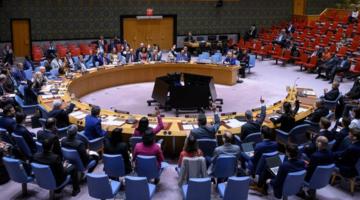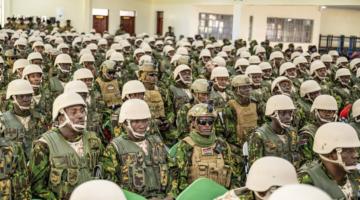The invasion of Haiti that has just begun with the arrival of Kenyan police, was long in the making. It is the end result of a long imperialist war of destabilization and propaganda against the country. Kenya's involvement is said to be a better solution than previous interventions, but it is just a cover for the goals of western imperialist machinations.
As we witness the arrival of Kenyan troops into Haiti, many might wonder how we got to this point, and perhaps believe that the Kenyans are there to do some good in terms of bringing peace and stability to the country. This is understandable as a great deal of time, energy and resources have gone into the propaganda pushed by the CORE Group (led by the U.S. and Canada) to justify this latest violation of Haitian sovereignty and self-determination.
The idea that Haiti needs to be saved from criminal and rebellious elements within its society has been a constant, even before the Bwa Caiman meeting that launched the Haitian Revolution in 1791. In 1915, the United States invaded Haiti in order to fight “the bandits.” This occupation lasted until 1934 and resulted in the creation of the Haitian military – a force that would become infamous for terrorizing the people's political organizations that challenged the parasitic Haitian elite and the Duvalier dictatorship that followed. The paramilitary organizations of the dictatorship were only removed by an uprising of the people, the dechoukaj, but many of these individuals never really went away. Many became the new political leaders in the country.
When Aristide was overthrown in 2004, the United Nations Stabilization Mission in Haiti (MINUSTAH) was argued as being necessary in order to save the country from being overrun by gangs. At that time, the narrative was that Aristide was using gangs and that they threatened the political stability of the country. Nevermind that a dictatorship aligned paramilitary organization had helped to set the stage for a military intervention that would overthrow Aristide.
When MINUSTAH entered Haiti in 2004, it was headed by the Brazilians, and they were regarded as the best fit given their left of centre political leadership – under President Luiz Inácio Lula da Silva -– and the experience of the Brazilian military and police fighting gangs in the favelas. Clearly experience and success are two different things. The Brazilians failed because the gangs aren't the main problem in Haiti.
The poor, young and often desperate men are an easy target; their political and economic bosses who live in gated compounds, fly on private jets, and own private ports are not. However, the gangs are a symptom of Haiti's crisis which is much greater - which no military can fix - whether they be from the United States, Jamaica or Kenya.
When we break it down, Haiti has once again been targeted by perhaps one of the most undemocratic interventions one can imagine, given that both Haitian and Kenyan leaders based this intervention upon the total disregard of domestic political institutions in their respective countries. In Haiti, you had a widely unpopular, unelected, foreign-installed politician in Ariel Henry (via a CORE Group tweet), who, at the time, ruled over a nation with ZERO elected representatives. This was due to more than a decade of Henry’s predecessors, Michel Martelly and Jovenel Moïse, who respectively came to power with deeply flawed U.S.-backed elections that saw the lowest, and second lowest turnouts in Haitian history, resulting in an incredibly weak, almost non-existent mandate to rule.
After the 2010 earthquake, Martelly was muscled into the election’s second round by Secretary of State Hillary Clinton and the United Nations Special Envoy and co-chair of the Interim Haiti Reconstruction Commission (IHRC) Bill Clinton. The gravity of this political moment is reflected in the fact that Hillary Clinton flew back from Egypt in the midst of the Arab Spring to pressure then president Rene Preval to accept the fact that the US, working with representatives of the Organization of American States (OAS), changed results of the elections. Preval was threatened with removal from both the presidency as well as Haiti, by MINUSTAH head Edmond Mulet. Preval eventually conceded, setting the stage for the kleptocratic, criminal Haitian Tèt Kale Party (PTHK) to take power and lead Haiti into a downward spiral.
According to the Haitian Constitution, Martelly was not eligible to run for president, as he had not lived in Haiti for the preceding five years, as mandated by the constitution. Martelly moved to Haiti in 2007 when his friend, the also undemocratically appointed heir to the incredibly violent 2004 coup, Gérard Latortue, concluded his appointment of Prime Minister. Breaking with the Haitian constitution a "council of the wise" was set up by the CORE Group to choose a new Prime Minister. Gerard Latortue was selected by the Council and appointed head of the interim government while still living in the United States – a process that would be repeated with the selection of Michel Martelly.
This is an example of how the Core Group does not govern Haiti directly; instead, its members exercise influence through the power of their “diplomatic” missions. This is how the Core Group maintains control of all major political decisions in the country, which recently included the decision as to appoint Henry by tweet, the selection of Martelly to be the de-facto leader and hatchet man after the 2004 coup, and rubber stamp the pillaging that would take place during the reconstruction in 2010.
Martelly was a self-admitted former gangster, who was part of the Ton Ton Macoutes, a Duvalier sponsored paramilitary organization that terrorized the Haitian people in his teens. He was a staunch supporter of the Duvalier dictatorship, opposed the prosecution of Jean Claude Duvalier, and even welcomed his son, Francois Nicolas Duvalier, into his administration as a consultant. Both Martelly and Moïse allowed the terms of elected politicians to expire so that they could rule by decree and faced no consequences from their international backers (the CORE Group). A major reason elections had been repeatedly postponed is that a functioning democratic system in Haiti would allow for Martelly, his administration and his immediate family to be held accountable for the numerous accusations and allegations of fraud, financial mismanagement and political repression.
In May 2019, Haiti’s Superior Court of Auditors and Administrative Disputes alleged that Moïse and other officials (including Martelly) embezzled an estimated $3.8 billion dollars. The court’s 656-page report alleges that the Martelly administration contracted a company then led by Moïse to carry out infrastructure projects that it never completed, largely using PetroCaribe funds. Moïse and the company denied the allegations. When Moïse was assassinated on July 7, 2021, Martelly was living lavishly in Florida with the stolen money, and the institutional breakdown initiated by Moïse and Martelly, with no elected politicians, led to a power vacuum with several competitors. With no clear constitutional way forward due to the collapse of all relevant political institutions, the CORE Group settled the power struggle through its appointment of Ariel Henry by a tweet.
Haitian community protests against Henry were a constant from 2021, especially as his regime followed IMF dictates to remove fuel subsidies, causing an immediate rise in inflation, and making the lives of already impoverished Haitians more difficult. In response to these protests, Henry blamed “gangs,” and the US and Core Group also intervened, working, since 2022, to send a military force to uphold the power of its puppet government. The US, with the help of Mexico, drafted the document for a “Multinational Security Support Mission” and presented it to the UN Security Council (UNSC). After three tries, the UNSC approved the mission, though insisted that it was not a UN mission, only sanctioned by the UN. And, after failing to get Canada, Mexico, Brazil, and the Caribbean Community to “lead” the mission, the U.S. was finally able to convince the Kenyan government with a promise of $300,000 million. However, the Kenyan Supreme Court – after protests by local groups – blocked the deployment of its police to Haiti.
It is within this context that the US arranged Henry’s travel to Kenya to fulfill the Kenyan Supreme Court’s request for a signed bilateral agreement between the two countries. On his way back to Haiti, Henry was denied entry into the country presumably by the armed groups and his plane was forced to land in Puerto Rico. It is then that the US abandoned Henry and forced him to promise to resign once they (the US) put in place a “transitional government in Haiti). Henry had done his work, with the signing of a Haiti-Kenya security agreement that would provide some questionable legal backing to the intervention. He could now be cast aside.
The President of Kenya, William Ruto has a very controversial record himself, as he is currently accused of numerous human rights violations (including the widespread extrajudicial murders of citizens within numerous shantytowns), the overruling of his own constitution in order to approve the military intervention, and, most recently,for violently putting down nationwide protests against his IMF backed austerity and tax reforms. Largely because of these actions, whereby Ruto sided with the CORE Group, Kenya has now been designated as a Major Non-NATO Ally in return for putting Kenyan bodies in the line of fire for crumbs.
Wanting to join in on this dumpster fire of “diplomatic” imperialism is CARICOM. The Caribbean Community is a supposed self-declared “zone of peace,” with non-intervention as one of its cherished principles. Yet several of its members have promised to contribute military and police forces to Haiti. All to be funded by the U.S. and Canada, with CARICOM leaders getting increased access to funding and loans.
So when we hear that the Kenyan military mission is needed in Haiti to restore stability and democratic norms, we must ask what stability or democracy? The “democratic” norms of the “international community” (a narrowly defined group that includes the US, France, and Canada) repeatedly prove that there is nothing “rules based” about them. The “international community” is instead parasitic, inherently violent, racist, and hypocritical. The so-called “rules based international order” needs to end. It is based on the rule of might of the imperialists who are currently going to great lengths and all four corners of the earth in order to assemble and fund a coalition of Black and Brown peoples to ensure Haiti’s neck remains under their boots.
This is the neocolonialism that Kwame Nkrumah warned us about – imperialism in Blackface. But the Haitian people are not fooled.
Kevin Edmonds (@kevin_edmonds) is a member of the Toronto-based Caribbean Solidarity Network (CSN), an organization committed to the principles of Caribbean Liberation and Unity across the region as well as throughout the Diaspora. He is also an assistant professor in the Caribbean Studies Program at the University of Toronto.

